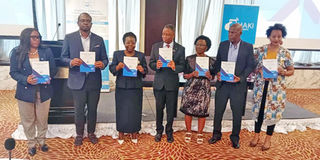Vast majority of formal sector workers lack contracts: report

Commission for Human Rights and Good Governance chairman Matthew Mwaimu (centre), Legal and Human Rights Centre (LHRC) executive director Anna Henga (third) left and other officials hold copies of LHCR’s Business and Human Rights Report during its launch in Dar es Salaam on August 27, 2024. PHOTO | ELIAS MSUYA
What you need to know:
- New findings show that 69.4 percent of workers in the formal sector have no valid contracts with their employers
Dar es Salaam. The vast majority of workers in Tanzania’s formal sector have no contracts, a new report has revealed.
The tenth report on Human Rights and Business released on Tuesday by the Legal and Human Rights Centre (LHRC) has identified several challenges, including the fact that 69.4 percent of workers in the formal sector have no valid contracts with their employers.
This is an increase of 4.8 percentage points compared with the situation in 2021/2022.
LHRC executive director Anna Henga said at the report’s launch that other issues highlighted in the document include the rights of vulnerable groups; 37 percent of workers being aware of the existence of trade unions in the country; delays in compensation payments; land valuation that does not reflect the cost of living; inadequate community participation in land acquisition for investment activities, especially in areas with extractive industries, and 56 percent of community members acknowledging benefiting from company community contributions.
“In consideration of the country's development and economic growth, as well as the importance of upholding human rights in the business sector, LHRC has persistently advocated human rights in business. LHRC has been actively involved in policy advocacy and ensuring the implementation of international agreements, guidelines and national laws related to business with respect to human rights,” Dr Henga said.
Commenting on challenges outlined in the report, the chairman of the Commission for Human Rights and Good Governance (CHRAGG), Judge (Retired) Matthew Mwaimu, said the findings will be considered in the formulation of the national strategy on human rights and business, which is currently being work upon by the government through the Human Rights Committee and other stakeholders.
“The committee has worked on various areas and has identified some experts who will lead the strategy. The strategy is important as it outline the government’s responsibilities in line with United Nations’ recommendations on human rights and business,” said Judge Mwaimu.
Tanzania Tobacco Control Forum (TTCF) executive director and LHRC board member Lutgard Kagaruki said she had expected the Agriculture ministry to be represented at the launch and get the message that tobacco, as a business, affects the lives of people involved in agricultural services.
She said according to the World Health Organization (WHO), 45 percent of people involved in tobacco farming are children and working on a tobacco farm for one day is equivalent to smoking 50 cigarettes.
“The report launched today reflects human rights and business, and tobacco farming affects the lives of many in terms of human trafficking and health. The ministry of agriculture should consider doing alternative crops instead of tobacco,” Ms Kagaruki said.
Association of Tanzania Employers (ATE) legal head Grace Seuya challenged LHRC to also identify challenges affecting people from the informal sector as a way of creating a good working environment for both workers in the country.
Human rights and business involve considering human rights within the business sector and activities.
The United Nations has provided the Guiding Principles on Business and Human Rights of 2011, which outline responsibilities under three main pillars for safeguarding and protecting human rights in business activities.
The report details the status of human rights in the business sector of the country. It is the outcome of research conducted by the LHRC through the human rights violation monitoring program in the business sector, as well as information from legal assistants, the media, and civil society organizations.
The report also examines various national and international reports, particularly those focused on describing the state of human rights in the business sector and companies operating in Tanzania.




